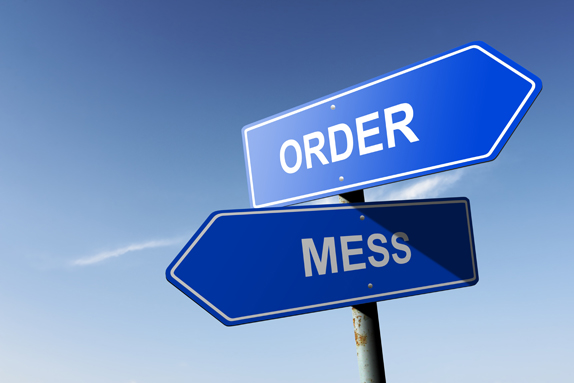One of the biggest road blocks in the path to productivity is stuff. We surround ourselves with the things we own, but in many ways our stuff really owns us. We have to maintain our stuff, clean our stuff, sort our stuff, get a bigger house to hold our stuff and move our stuff to find other stuff.
Now it isn’t that stuff is bad, but we have to recognize that everything comes with a cost. Most people recognize this with pets. Before you get a dog, you think through the responsibility it will entail, who will watch it when you travel, etc. While stuff may not be as high-maintenance as a dog or cat, there are very few things that are truly maintenance free.
The problem is that many people are very bad at deciding what is actually important to them, so they end up acquiring a great number of items that aren’t particularly important to them, but consume their time and space. They never get rid of anything because they don’t have any mental framework to understand what really isn’t valuable to them. When you don’t know what is important, you tend to keep everything.
The point here isn’t to get rid of everything down to a specific number. I know people who are trying to live with only 50 things, but that probably isn’t going to work for most people. Really, the goal is to make sure that your precious time and effort isn’t getting sucked away taking care of things you don’t really even want.
Here are some suggestions:
Fewer, better things
Sometimes we have lots of stuff because we aren’t willing to invest in what we really need. Clothing is often an example. A well-planned wardrobe is likely to have a lot fewer items than something that was randomly assembled over the past five years.
Invest, don’t buy
When we go shopping, the goal is to acquire things. Really, that is the whole point–to add something to our collection of stuff. On the other hand, if you look at purchases as an investment, it can dramatically change the way you approach purchases. Back to the clothes example, think about the different mentality behind someone who is going “shopping for clothes” and someone who is going to “invest in a wardrobe.” The simple change in words leads to a focus on the utility and function of the things that are going to be acquired instead of just assuming that the acquisition is an end in itself.
Decide what is important
This comes down to understanding your values. Don’t feel guilty for keeping things that are valuable, but don’t waste your time on things that are not. For example, books are very valuable to me. I want my children to grow up surrounded by books. As a result we have 2,000+ books in the house. On the other hand, we don’t place much value on owning movies and only have a very small number of those.
I’m not saying that it is better to have books than movies, just that the items in our house intentionally reflect our values.
Purge
I can pretty much guarantee that stuff is going to find a way into your home. One way or another, if you aren’t intentional about it, you’ll have more things a year from now than you do today. The only way to deal with this is to take the time to get rid of the things you don’t want. Just because you don’t really want something won’t make it go away. You have to actually invest the time in getting rid of it.
Everyone has a different personality and different values, so everyone is going to approach managing their stuff in a different way. It isn’t so important how you manage all the things in your life as it is that you do so by intent and not just accident.

Yes!
Every time I shop I ask myself not how much something is worth, but how much will it cost me. That is, if I take the money that I am using to purchase a pair of jeans and apply it to an investment, I can make ‘x’ dollars from it. Conversely, if I proceed and buy the jeans instead of investing, it costs me ‘x’ dollars. Not surprisingly, the amount it costs is usually far more than the price tag of the item.
“Just because you don’t really want something won’t make it go away. You have to actually invest the time in getting rid of it.”
Omg I love that! It made me do an quick assessment of my clutter status and realize there’s a “put in storage” pile on my floor that has been there for 2 years. Every day I walk by it, and sometimes even step over it, and don’t even notice it. I guess when I collected it into a pile and freed up the space it was using, it registered in my mind as such a big accomplishment that it also registered as a done deal!
One positive thing came from this: Now I know I’ll never use the items in the storage pile so that is now the “giveaway” pile AND it’s on my to do list to actually give it away. :)